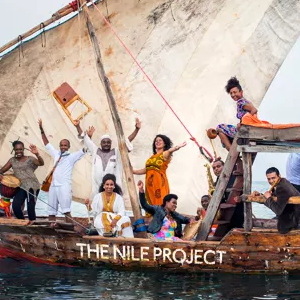
The Nile Project releases first studio album in-step with 2017 US Tour.
If the world's longest river could sing: The Nile Project releases first studio album in-step with 2017 US Tour.
“Seductive and beautiful [...] nothing short of revolutionary.”—Afropop Worldwide
Drawing on modern production methods and a healthy dose of vintage equipment, propelled by a collective international spirit and sheer determination, Jinja (release: January 18, 2017) is imbued with intimacy, warmth, urgency, power, air and hyper-realism.
“After a few proper recording dates earlier in the tour, we started converting my hotel rooms into guerrilla recording studios using a mobile rig,” explains Nile Project recording engineer and Music Program Manager Andrew Reissiger. “As we checked into hotels, we would run room-to-room and identify the quietest spot for the studio. Then, mattresses and box springs would go up against the windows, chairs and luggage would get stacked in the corners, and extra bedding taped to walls. When the tour ends and your band is about to spread out over 4,000 miles, you have to be creative.”
Jinja is the long awaited follow-up to Aswan, the live recording from the Nile Project’s debut concert in 2013. Featuring artists from Burundi, Egypt, Ethiopia, Kenya, Rwanda, Sudan, and Uganda, the album consists of ten original compositions born during the Nile Project’s 2nd annual musicians Gathering in Jinja, Uganda. Each year, the Nile Project convenes a selection of artists from its growing Musicians Collective. A phenomenon that moves from music school to composition boot camp to full-scale rehearsal, musicians from the 11 Nile countries explore all manners of combining their diverse languages, musical modes, rhythms, timbres, and playing styles. The Nile Gathering is two weeks of musical roulette that gives every artist a chance at the driver’s seat. To the listener, the performance is an aural adventure with many unexpected twists and textures.
 On the surface, the Nile Project blends traditional musical idioms into one seamless Nile sound. But look a little further and you’ll begin to see a 35-member Musicians Collective modeling contemporary organizational concepts such as systems thinking, network theory, and participatory leadership.
On the surface, the Nile Project blends traditional musical idioms into one seamless Nile sound. But look a little further and you’ll begin to see a 35-member Musicians Collective modeling contemporary organizational concepts such as systems thinking, network theory, and participatory leadership.
The Nile Project is pioneering a new approach to transform trans boundary water conflicts by using music to ignite cross-cultural empathy and spark environmental curiosity. Recent invitations to lead workshops and performances for key diplomats and policymakers at the United Nations, the European Commission, and the African Union attest to the capacity of these collaborations to transform the way we think and interact with respect to the many challenges we collectively face.
Jinja captures cross-cultural musical collaborations among artists sharing diverse relationships to world’s longest river. Kindred harps and resonant lyres from the Nile’s sources in East Africa and Ethiopia to its deltas in Sudan and Egypt have reunited to learn new musical modes while buzzing timbres and ingenious
poly rhythms support vocals in six languages.
As a recording, Jinja presents accessible songs where each lead artist leverages their band mates’ musical strengths and instruments to realize their vision. African and Middle Eastern music aficionados will identify the distinctly Eg yptian Dil Mahbuby, the Ethiopian Ya Abai Wuha, the Ugandan Omwiga, and the Burundian
Biwelewele and Uruzi Nil.
On other tracks, Nile Project artists explore creative musical combinations. Ethio-Jazz meets Arabic taqsim (instrumental improvisation) in Tenseo. Allah Baqy is a love song contrasting Egyptian and Sudanese Arabic dialects. Marigarita captures an unexpected friendship between a Rwandese and an Ethiopian artist. Mulunge Munange highlights East African musical connections among Ugandan, Burundian and Rwandese neighbors. And Inganji is a Nile hootenanny that starts in Rwanda and, like the river, flows through its riparian sounds one after another.

Tenseo, for example, begins with a dark and contemplative hymn often sung during Good Friday in the Ethiopian Orthodox church. The composition evolves into a polymodal collaboration combining various Ethiopian and Arabic scales. The final result is a mix of traditional and contemporary, of sacred liturgical text
and profane jazz improvisations between Ethiopians and Egyptians. This piece couldn’t take place without both parties in the room. Afropop Worldwide has called it a “masterpiece.”
In Marigarita, Rwandese Sophie Nzayisenga internalizes another polymodal combination by playing a Tizita minor Ethiopian groove on her enanga (plucked zither) while singing in a Tizita major scale. To complete the loop, Ethiopian Selamnesh Zemene responds in the same Ethiopian scale played on the enanga.
The soundtrack to the Nile Project's historic 2015 US Tour, Jinja showcases the rich diversity of one of the oldest places on Earth and captures the maturity of 3 years of collaboration among musicians representing over 450 million people.
Here's one of the track from the newly released album Jinja called "Inganji." Enjoy and don't forget to follow the artists link below for more information on how to acquire the entire album.
[sc_embed_player_template1 autoplay=true volume="25" fileurl="https://adunagow.net/wp-content/uploads/audio/01 Inganji_Jinja2017_TheNileProject.mp3"] Nile Project Artists:Dawit Seyoum / Ethiopia / krar, bass krar
Dina El Wedidi / Egypt / vocals
Hany Bedair / Egypt / doof, tabla, riqq
Jorga Mesfin / Ethiopia / saxophone
Kasiva Mutua / Kenya / ohangla, djembe
Meklit Hadero / Ethiopia / vocals
Micheal Bazibu / Uganda / adungu, entongoli, uganda drums, engalabi
Mohamed Abozekry / Egypt / oud
Nader Elshaer / Egypt / qawala
Sarah Abunama-Elgadi / Sudan / vocals
Selamnesh Zemene / Ethiopia / vocals
Sophie Nzayisenga / Rwanda / vocals, enanga
Steven Sogo / Burundi / vocals, bass, ikembe
For more information, please contact:
Noor Salama
+20-106-237-2227
noor@nileproject.org
nileproject.org



